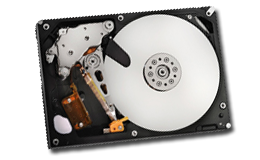Hitachi Shipping 2 TB 7,200 RPM Hard Drive
Bigger drives getting faster.

Looking for a consumer-level 2 TB 7,200 RPM hard disk drive? Hitachi is the first to the table to offer such a product. While Western Digital was the first to 2 TB and Seagate was the first to take it to 7,200 RPM with an enterprise drive, Hitachi's freshly announced 2 TB Deskstar 7K2000 is the first to in its size class for the mainstream desktop user.
The new Deskstar 7K2000 uses a five-platter design with "relaxed bit density" and perpendicular magnetic recording (PMR) technology. The drive also features a 32 MB cache and a 3 Gb/s SATA interface. Thanks to newer power management technology, the Deskstar 7K2000 offers 10 percent idle power savings over previous generations.
In addition to the new 2 TB Deskstar 7K2000, Hitachi announced that it is also refreshing its high-volume desktop hard drive family. The new 7200 RPM Deskstar 7K1000.C family will deliver up to 500 GB per platter, and will come in capacities of 160 GB to 1 TB.
Stay On the Cutting Edge: Get the Tom's Hardware Newsletter
Get Tom's Hardware's best news and in-depth reviews, straight to your inbox.
-
eklipz330 at the rate sizes are increasing this day and age, im going to have to stop watching the porn, and just start downloading it.Reply -
ColMirage My 74gb HD is so tiny itsy bitsy! I wonder what they're doing with the SBM contest, I think they changed their mind and don't want to give them away anymore. :PReply -
eklipz330 at the rate sizes are increasing this day and age, im going to have to stop watching the porn, and just start downloading it.Reply -
Spanky Deluxe Hopefully Seagate will soon release a 2TB 7200rpm drive. I could really do with getting one or two of them.Reply -
anamaniac Cool.Reply
What about performance and reliability?
Still have my old Seagate 80GB and 250GB 7200.10 drives (one of the non fail series) that prove enough until I start torrenting every damned game I see again... My 10k+ music collection is only something like 70GB anyways. I personally haven't seen a use to go beyond 1TB, yet.
Most Popular





